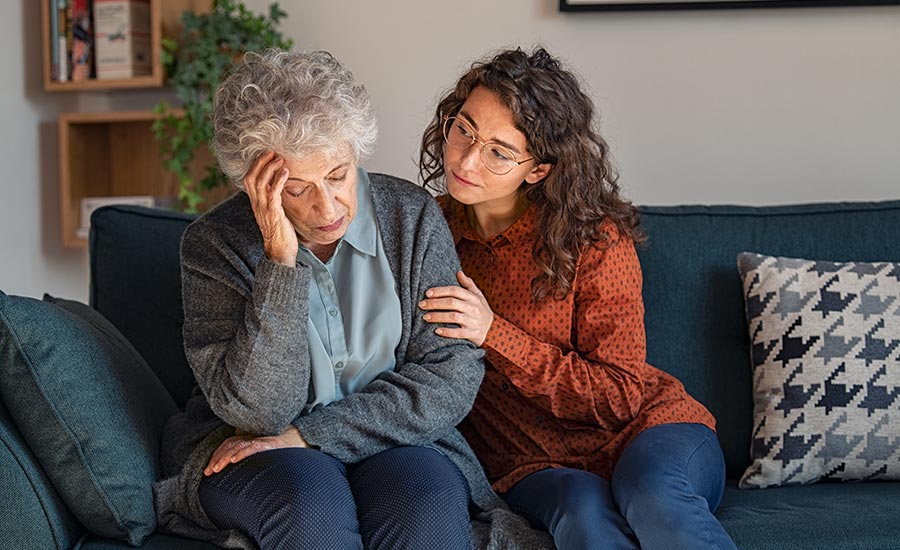What To Say to a Dying Loved One During Their Final Days

When a loved one is dying, finding the right words to say can feel like an impossible feat. Whether you’re worried about saying the wrong thing or you’re not sure where to begin, we’re here to help.
In this guide, we’ll explain what to say to a dying loved one to provide comfort and care during their final days.
We’ll also share how our compassionate team at Always Best Care Senior Services can help you care for a dying loved one during this profoundly emotional and difficult time.
Table of Contents
What To Say to a Dying Loved One
Talking to a dying loved one can be challenging when you can’t find the right words to offer support and comfort. While there’s no script to follow in a situation like this, you can create meaningful conversations despite the fact that it is a difficult time.
When talking to a dying loved one:
- Ask how your loved one is doing. Talk about their feelings, thoughts, and worries, and ask how their day went.
- Ask what your loved one needs. Let your loved one know that you’re there to help however you can.
- Express your love. Tell your loved one that you love them, you are there for them and that they matter to you.
- Provide reassurance. Remind your loved one that they are not alone and that you are there to support them throughout this difficult time.
- Say thank you. Thank your loved one for their love, guidance, and support over the years and acknowledge how they have positively impacted your life.
- Validate your loved one’s feelings. Acknowledge their emotions and let them know that it’s okay to feel scared, sad, or uncertain.
- Forgive your loved one. If your loved one hurt you in the past, let them know that you’ve forgiven them.
- Say goodbye. Let your loved one know that it’s okay for them to let go. Express your love and gratitude for the time you’ve had together, and reassure them that you’ll be okay.
Keep in mind that your support and presence during this challenging time is what truly matters. What you say isn’t as important as being there emotionally and physically to provide support and comfort.

What Not To Say to a Dying Loved One
When speaking with a dying loved one, it’s important to be sensitive and mindful of their emotions.
Here’s what not to say to a loved one who has received a terminal diagnosis or near the end of their life:
1. Do Not Provide False Assurances
Be careful not to give false assurances to a dying loved one, as it can create a sense of false hope, which can be emotionally harmful when reality sets in.
Instead of providing false assurances, offer genuine support, empathy, and a safe space for your loved one to express their emotions, fears, and concerns.
This approach can help build trust and strengthen your connection with your loved one during this difficult time.
2. Do Not Force a Conversation
Do not force a conversation with your loved one if they do not want to talk about certain topics.
Forcing a conversation can make your loved one feel overwhelmed or pressured, which can cause additional stress.
Instead of forcing a conversation, allow your loved one to lead the discussion. This approach provides them with a sense of control and dignity during a time when they may feel like they have little control over their situation.
3. Do Not Bring Up Old Grudges
Do not bring up old grudges or past arguments that you had with your loved one, as it can create tension, regrets, and emotional distress that can affect their ability to find peace during their final days.
Instead of bringing up old grudges, look back on positive memories with your loved one, such as reminiscing about their hobbies, your childhood or holiday celebrations.
As your loved one’s time and energy become more precious when they’re nearing their final days, make sure to offer your support and empathy.
Share happy memories, but also respect their boundaries as they process their emotions during this difficult time.
What To Do for Someone Who Is Dying
Providing care and comfort for a dying loved one can be an emotionally challenging experience, but with understanding and empathy, you can make sure they feel loved and supported during their final days.
Here’s what to do for someone who is dying:
- Provide your loved one with a safe space to share their thoughts, feelings, and fears. Listen to their concerns and offer comforting words, but also respect their need for solitude, if that’s what they prefer.
- Take a walk down memory lane with your loved one. From memorable Christmas parties and meaningful family reunions to unforgettable vacations, reminisce with your loved one to help reassure them that their memories will stay with you, despite their passing.
- Create a comfortable environment for your loved one. Set soft lighting and soothing music, and make sure your loved one’s room temperature is around 64 to 68°F — the ideal room temperature for optimal comfort.
- Surround your loved one with familiar items. Place family photographs, personal belongings, and favorite possessions in your loved one’s room to bring a sense of comfort and familiarity.
- Be present. Your presence is one of the most significant sources of comfort for your loved one. Whether it’s holding their hand or just sitting nearby, being present can provide relief and reassurance.
- Ask close friends and family members to visit. Your loved one will likely find comfort in seeing familiar faces.
- Make sure your loved one is clean and comfortable. Change soiled clothes as soon as possible to help prevent skin infections and use pillows and blankets to reduce pressure and increase comfort.
- Encourage your loved one to continue performing regular routines and activities, if possible, during their remaining days. This might include taking a bath, going for a walk, or working on a hobby.
- Encourage your loved one to create a meaningful keepsake to pass on. It might comfort your loved one to write letters to family members or friends, or put together a memory box that holds special mementos they want to pass down to a child or grandchild.
- Respect your loved one’s end-of-life care preferences. Ensure that their wishes are honored, from large details like burial and ceremony preferences to smaller details.
Here’s what you can do to help prevent burnout when caring for a dying loved one:
- Connect with a support system. Find support from friends, family, or a licensed psychologist to help you cope with the emotional challenges that come with caring for a dying loved one. Grief and bereavement support groups can also be valuable resources during this time.
- Work with your loved one’s healthcare provider. Make sure your loved one’s symptoms and discomfort are managed as much as possible.
- Give yourself a break. Caring for a dying loved one can be both physically and emotionally draining. Consider respite care to help you recharge and manage your well-being. (Read our guide on understanding spousal caregiver burnout and overcoming the challenges of being a family caregiver for more info.)

Caring for the Dying With Always Best Care Senior Services
At Always Best Care, we are passionate about delivering exceptional healthcare services tailored to the unique needs of the elderly, including in-home care and respite care.
Our dedicated team has consistently provided reliable senior care across the United States and Canada for over 25 years.
Our network spans over 225 locations, allowing us to serve families in need with exceptional dedication and support.
At Always Best Care, we provide:
- In-home care services, where we support your loved one in the comfort of your home. This includes live-in care, hospice support and end-of-life care.
- Skilled health care services, where we provide around-the-clock support for your loved one and create a personalized home care plan for them.
- Senior living referral services, where we recommend assisted living, memory, and residential care for your loved one. This includes medical emergency response, social and recreational services, housekeeping, and oversight of supportive and personal services.
- Special care services, where we utilize advanced special care solutions for your loved one.
- Respite care services, where we take over care so you can take the breaks you need.
Wrapping Up on What to Say to a Dying Loved One
While finding the right words to say to a dying loved one can be extremely difficult,
open communication, empathy, and simply being present can make a profound difference during this delicate time.
It’s important to create a safe space where your loved one feels understood, supported, and at peace. By focusing on heartfelt and positive conversations, you can help ease their transition and make the most of their remaining time.
At Always Best Care Senior Services, we understand that saying goodbye to a loved one is never easy.
Our end-of-life care services are designed to help ease this challenging transition, providing comfort and support to your family and your loved one when it’s needed most.
Our compassionate team will provide both medical and emotional support, to ensure that your loved one’s final moments are dignified and peaceful.





